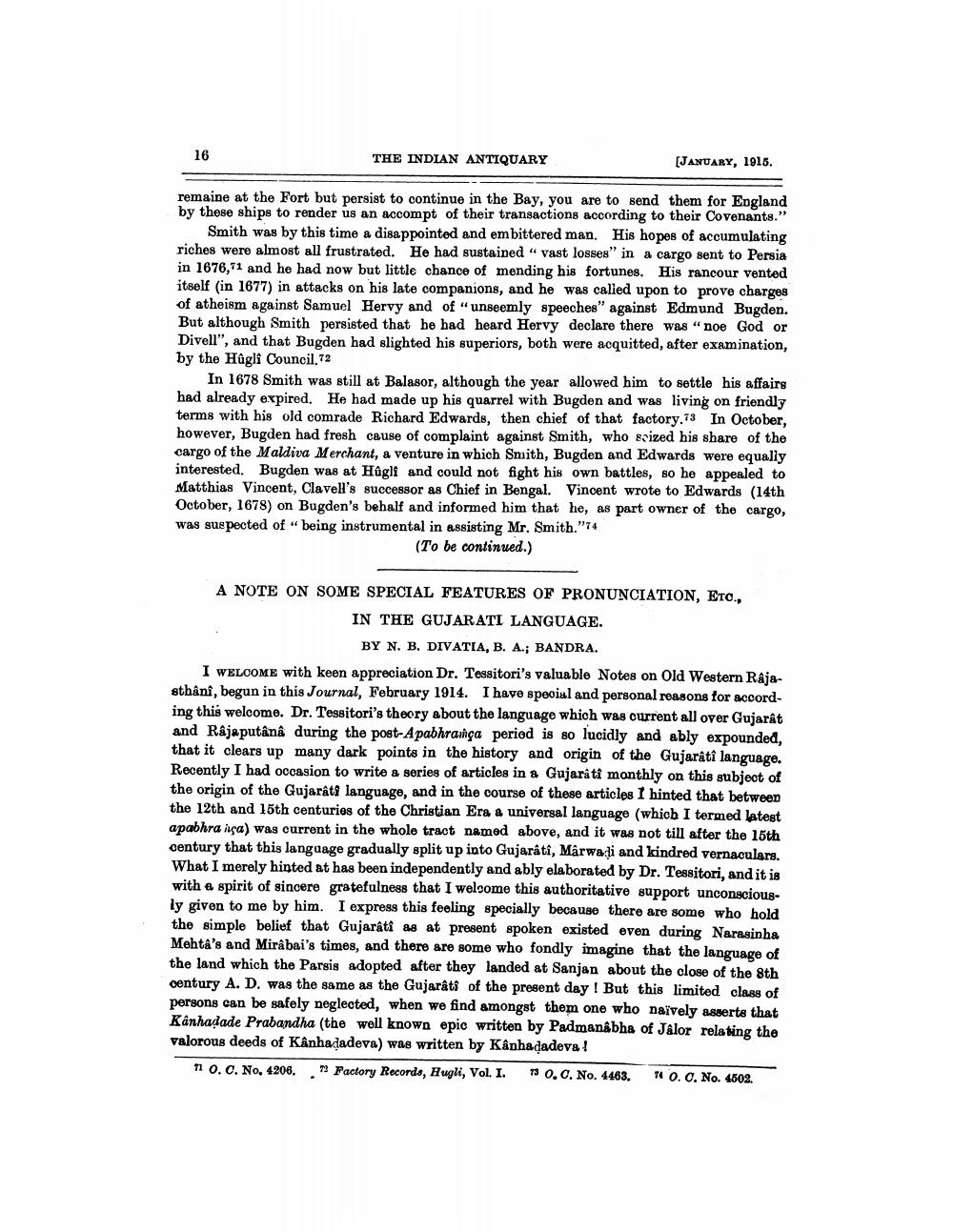________________
THE INDIAN ANTIQUARY
[JANUARY, 1915.
remaine at the Fort but persist to continue in the Bay, you are to send them for England by these ships to render us an accompt of their transactions according to their Covenants."
Smith was by this time a disappointed and embittered man. His hopes of accumulating riches were almost all frustrated. He had sustained “ vast losses" in a cargo sent to Persia in 1676,71 and he had now but little chance of mending his fortunes. His rancour vented itself in 1677) in attacks on his late companions, and he was called upon to prove charges of atheism against Samuel Hervy and of "unseemly speeches" against Edmund Bugden. But although Smith persisted that he had heard Hervy declare there was "noe God or Divell", and that Bugden had slighted his superiors, both were acquitted, after examination, by the Hûgli Council,72
In 1678 Smith was still at Balasor, although the year allowed him to settle his affairs had already expired. He had made up his quarrel with Bugden and was living on friendly terms with his old comrade Richard Edwards, then chief of that factory.73 In October, however, Bugden had fresh cause of complaint against Smith, who sized his share of the cargo of the Maldiva Merchant, a venture in which Smith, Bugden and Edwards were equally interested. Bugden was at Høgli and could not fight his own battles, so he appealed to Matthias Vincent, Clavell's successor as Chief in Bengal. Vincent wrote to Edwards (14th October, 1678) on Bugden's behalf and informed him that he, as part owner of the cargo, was suspected of being instrumental in assisting Mr. Smith."74
(To be continued.)
A NOTE ON SOME SPECIAL FEATURES OF PRONUNCIATION, Ero..
IN THE GUJARATI LANGUAGE.
BY N. B. DIVATIA, B. A.; BANDRA. I WELCOME with keen appreciation Dr. Tessitori's valuable Notes on Old Western Rajasthani, begun in this Journal, February 1914. I have special and personal reasons for according this welcome. Dr. Tessitori's theory about the language which was ourrent all over Gujarat and Rajaputânâ during the post-Apabhra nga period is so lucidly and ably expounded, that it clears up many dark points in the history and origin of the Gujarati language. Recently I had occasion to write a series of articles in a Gujarati monthly on this subject of the origin of the Gujarati language, and in the course of these articles I hinted that between the 12th and 15th centuries of the Christian Era a universal language (whicb I termed latest apabhrança) was ourront in the whole tract named above, and it was not till after the 15th century that this language gradually split up into Gujarati, Marwadi and kindred vernaculars. What I merely hinted at has been independently and ably elaborated by Dr. Tessitori, and it is with a spirit of sinoere gratefulness that I welcome this authoritative support unconsciously given to me by him. I express this feeling specially because there are some who hold the simple belief that Gujarati as at present spoken existed even during Narasinha Mehta's and Mirabai's times, and there are some who fondly imagine that the language of the land which the Parsis adopted after they landed at Sanjan about the close of the 8th century A. D. was the same as the Gujarati of the present day ! But this limited class of persons can be safely neglected, when we find amongst them one who naïvely asserts that Kanhadade Prabandha (the well known epic written by Padmanabha of Jalor relating the valorous deeds of Kanhadadeva) was written by Kanhadadeva!
110. O. No, 4206.." Factory Records, Hugli, Vol. I. 70.0, No. 4463. 10. O. No. 4502.




